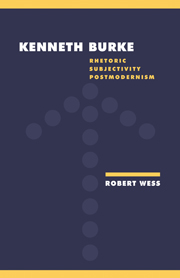Book contents
- Frontmatter
- Contents
- Preface
- Acknowledgments
- List of abbreviations
- 1 Ideology as rhetoric
- 2 Counter-Statement: aesthetic humanism
- 3 Permanence and Change: a biological subject of history
- 4 Attitudes toward History: the agon of history
- 5 The Philosophy of Literary Form: history without origin or telos
- 6 A Grammar of Motives: the rhetorical constitution of the subject
- 7 A Rhetoric of Motives: ideological and utopian rhetoric
- 8 The Rhetoric of Religion: history in eclipse
- Index
4 - Attitudes toward History: the agon of history
Published online by Cambridge University Press: 21 May 2010
- Frontmatter
- Contents
- Preface
- Acknowledgments
- List of abbreviations
- 1 Ideology as rhetoric
- 2 Counter-Statement: aesthetic humanism
- 3 Permanence and Change: a biological subject of history
- 4 Attitudes toward History: the agon of history
- 5 The Philosophy of Literary Form: history without origin or telos
- 6 A Grammar of Motives: the rhetorical constitution of the subject
- 7 A Rhetoric of Motives: ideological and utopian rhetoric
- 8 The Rhetoric of Religion: history in eclipse
- Index
Summary
… peace is something we must fight for…
Burke, GMThe so-called “I” is merely a unique combination of partially conflicting “corporate we's.”
Burke, “Dictionary of Pivotal Terms”In later commentary on PC, Burke twice disavows its history – magic, religion, science – first in the second edition (lix) and again in the third (307). He also implicitly disavows it in ATH, only two years after PC, as he offers a new historical narrative, one that is much longer, constituting the second of the book's three parts, and altogether different in conception and theoretical importance.
Burke remarks retrospectively “that P&C is to ATH as Plato's Republic is to his Laws. That is, just as the Republic deals with an ideal state, and the Laws deals with a real one, so P&C thinks of communication in terms of ideal cooperation, whereas ATH would characterize tactics and patterns of conflict typical of actual human associations” (CS 216). This characterization is accurate as far as it goes, though it can mislead: ATH is not an application of an ideal to reality but a theoretical reorientation in which the tension between PC's constructionist and essentialist sides is resolved in favor of the constructionist.
In the historical narratives in both PC and ATH there is an agonistic process in which cultural orthodoxies displace one another. But PC's narrative is simple and abstract because it conceives this process as a projection of motivations rooted in a biological subject of history.
- Type
- Chapter
- Information
- Kenneth BurkeRhetoric, Subjectivity, Postmodernism, pp. 84 - 107Publisher: Cambridge University PressPrint publication year: 1996



